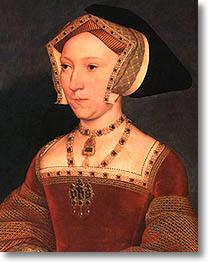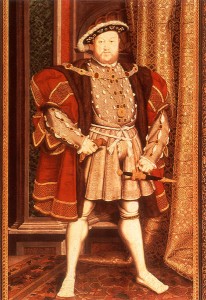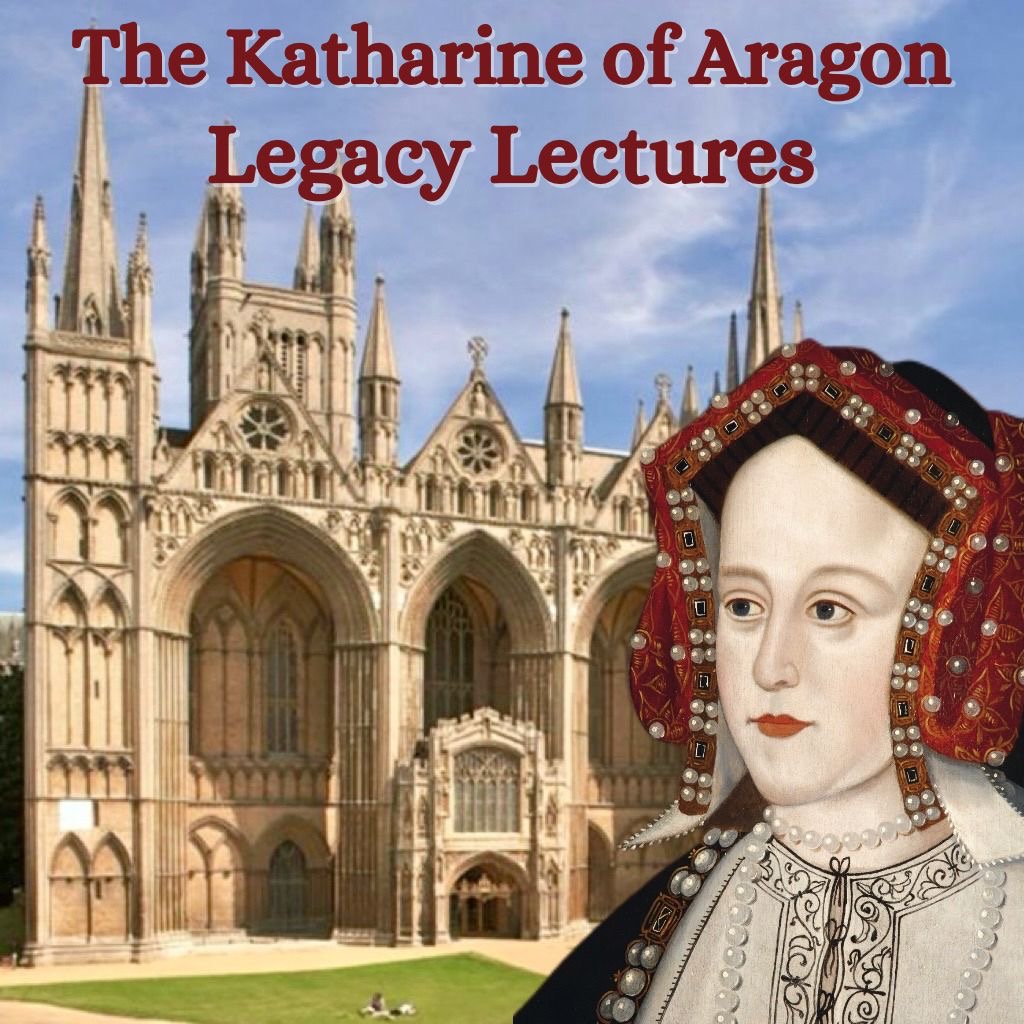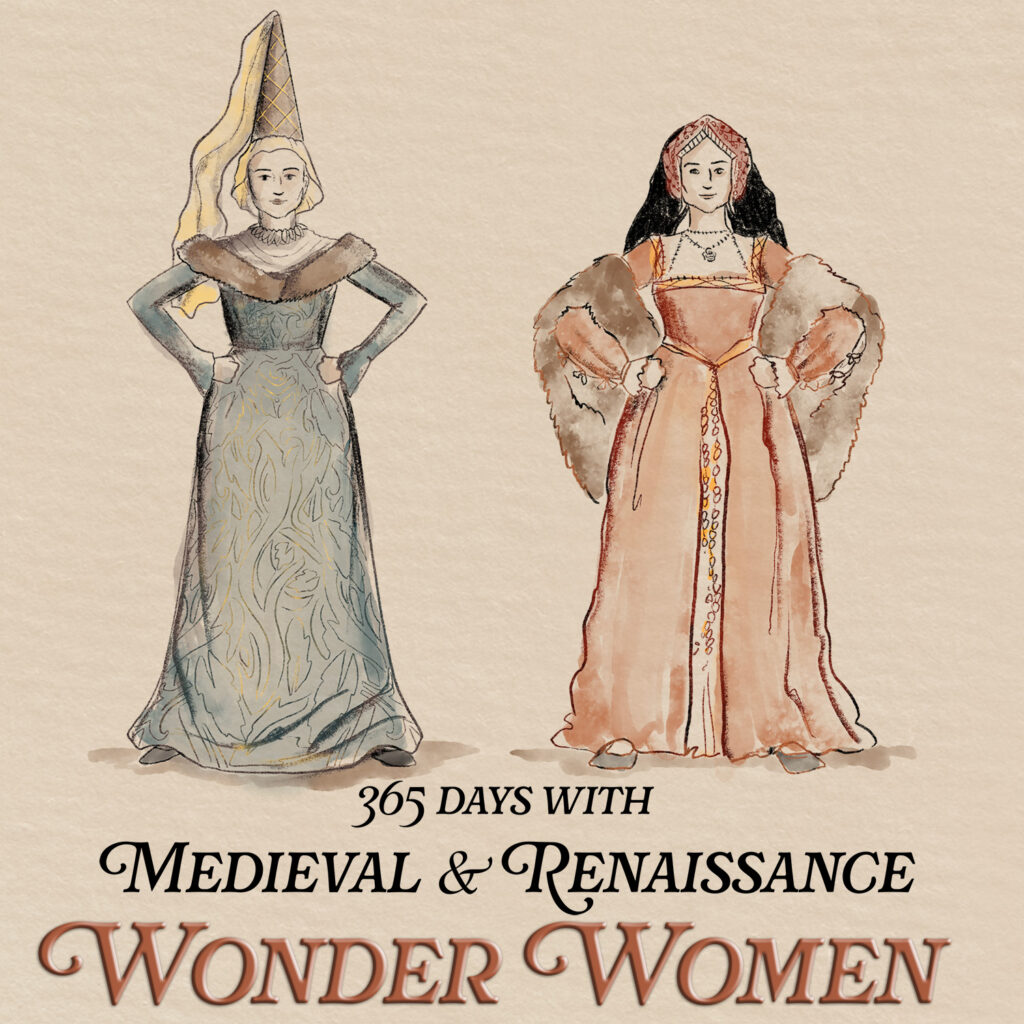Delighted to be hosting day four of Lauren Mackay’s virtual book tour for Inside the Tudor Court: Henry VIII and his Six Wives Through the Writings of the Spanish Ambassador Eustace Chapuys. Lauren has kindly shared with us an extract from her book and Amberley Publishing have generously donated a copy of Inside the Tudor Court to giveaway to one lucky commenter.
Giveaway now closed!
Conditions of Entry
For your chance to win a copy of Inside the Tudor Court, you must be subscribed to On the Tudor Trail’s newsletter (if you are not already, sign up on our homepage).
Then simply leave a comment after this post between now and 10 April 2014. Don’t forget to leave your name and a contact email.
This giveaway is open internationally.
A winner will be randomly selected once the competition is closed and contacted by email shortly thereafter.
Good luck!
The year is 1536…
Extract from ‘Inside the Tudor Court’
by Lauren Mackay
The ambassador’s 1 April despatch is perhaps one of his most interesting reports to Charles regarding the relationship between Anne and Cromwell. The original is no longer in Vienna nor is it found in the Brussels archives, but the editor of the Spanish Calendar, Pascal Gayangos, evidently translated both the letter to Charles and the shorter summary to de Granvelle. Chapuys held a supper at his house in April for the conservative faction. The guests included Henry Grey, son-in-law of the Duke of Suffolk and great-grandson of Elizabeth Woodville and Edward IV; Henry Pole, brother of Reginald; and Elizabeth Grey, the Dowager Countess of Kildare. The topics of discussion were Henry’s possible new marriage, and the rumour of a rift between Cromwell and Anne was confirmed. Chapuys was able to divulge his own rumour from the Imperial ambassador in France, that Henry had secretly asked for the hand of Francis’s daughter. The ambassador however was sceptical, and visited Cromwell the next day to confirm the rumour. The following account of their meeting following the dinner is interesting in that it details not only expressions and gestures, but even where the men stood as they spoke. We see Cromwell in action, while the ambassador considered his words. The ambassador observed that Cromwell’s manner was cold and indifferent when he said: ‘Although the King, his master, was still inclined to pay court to ladies, yet it was generally believed that in the future he would lead a more moral life than hitherto – a chastened marital one with his present Queen.’ Yet Cromwell then moved away and leant against the window, looking out and covering a smile with his hand.
Was Cromwell truly sharing a joke with Chapuys at Henry’s expense, or, more likely, gaining Chapuys’ trust by sharing an honest moment? Chapuys then made a surprising admission:
The love and affection I bore the King, and him in particular, as well as my earnest desire for the peace, honour, and prosperity of England, made me wish that he should have another royal mistress, not out of hatred of Anne Boleyn, for she had never done me any harm, but for his own sake.
Chapuys’ language when referring to Anne was noticeably different. His vehement language had mellowed to a degree; for the moment it was not personal, it was business. Katherine was now dead, Anne’s position was tenuous and Mary seemed to be in a stronger position.
 The English Reformation was well underway, with Henry’s suppression of the monasteries, and Cromwell at the helm. More than 300 religious houses were stripped of their wealth, resulting in a revenue which Chapuys estimated would likely exceed 120,000 ducats, as well as silver plate, chalices and other items. The rift between Anne and Henry’s first minister was apparently due to Cromwell’s use of the funds, which Anne vehemently disagreed with. Again she had misjudged Henry, who was more than happy placing his trust in Cromwell’s vision. The ambassador’s spies also kept him informed of the latest religious changes made by Cranmer and his council. In April he could report, ‘They do not admit of Purgatory, nor of the observance of Lent and other fasts, nor of the festivals of Saints and worship of images, which is the shortest way to arrive at the plundering of the church of St. Thomas of Canterbury and other places of resort for pilgrims in this country.’
The English Reformation was well underway, with Henry’s suppression of the monasteries, and Cromwell at the helm. More than 300 religious houses were stripped of their wealth, resulting in a revenue which Chapuys estimated would likely exceed 120,000 ducats, as well as silver plate, chalices and other items. The rift between Anne and Henry’s first minister was apparently due to Cromwell’s use of the funds, which Anne vehemently disagreed with. Again she had misjudged Henry, who was more than happy placing his trust in Cromwell’s vision. The ambassador’s spies also kept him informed of the latest religious changes made by Cranmer and his council. In April he could report, ‘They do not admit of Purgatory, nor of the observance of Lent and other fasts, nor of the festivals of Saints and worship of images, which is the shortest way to arrive at the plundering of the church of St. Thomas of Canterbury and other places of resort for pilgrims in this country.’
There is a Lutheran flavour to the changes, but there was one particular issue which would always prevent Henry and Anne from adhering to Lutheranism proper: in Martin Luther’s eyes, Henry’s first marriage was valid and thus Mary’s legitimacy was unquestioned.
Chapuys’ despatches finally now give us a glimpse of Jane Seymour, soon to replace Anne as Henry’s wife. Henry had been paying court to her since January 1536, and perhaps even since late 1535, and by April he was obviously captivated by her. He had played a long waiting game with Anne but was not prepared to repeat it with Jane. In April he sent Jane a purse full of coins with a letter, the idea being that Jane would be paid for her ‘services’ should she give them. Her calm and measured response took everyone by surprise.
Reports Chapuys,
Respectfully kissing the letter, she returned it to the messenger without opening it, and then falling on her knees, begged the royal messenger to entreat the King in her name to consider that she was a well-born damsel, the daughter of good and honourable parents without blame or reproach of any kind; there was no treasure in this world that she valued as much as her honour, and on no account would she lose it, even if she were to die a thousand deaths. If the King wished to make her a present of money, she requested him to reserve it for such a time as God would be pleased to send her some advantageous marriage.
Jane’s shrewd move says a lot not only about those coaching her, but her own quiet determination. She had clearly learnt more from Anne Boleyn than she would care to admit – the art of enticing the suitor, then drawing back, while always protesting her virtue. Henry fell for the same trick twice. Jane was neither the fiery, quick-witted Anne, nor a dim-witted doormat. She was clever enough to return the letter unopened as a tactful way of extricating herself from being propositioned.
Gertrude Courtenay, Marchioness of Exeter and old friend of Katherine of Aragon’s, could report that Henry was now consumed by his infatuation. She had played her part – the honourable maiden – to perfection, which appealed to Henry’s vanity. Having tried his luck with the sultry vixen, he was ready for something different. Henry now courted Jane with the utmost respect, only spending time with her in the company of chaperones. Cromwell was eager to assist, offering his private rooms at court, which ‘have access through certain galleries without being seen, of which room the young lady’s elder brother and his wife have already taken possession for the express purpose of her repairing thither’.
Henry was perhaps the only person who believed his seduction was an organic process; even Chapuys had heard that Nicholas Carew, a courtier who had been waiting for the opportunity to destroy Anne, had coached Jane carefully, and he took up his role with gusto. Jane was encouraged to poison Henry’s mind against his wife, presenting herself as an alternative. Chapuys notes, ‘In fact, it will not be Carew’s fault if the aforesaid concubine, though a cousin of his, is not overthrown one of these days, for I hear that he is daily conspiring against her, and trying to persuade Miss Seymour and her friends to accomplish her ruin.’
Jane was a rallying point and a popular one with the conservative faction. Anne had struggled to win over her court, but without Henry’s favour she was at her most vulnerable. Jane took the initiative whenever she spent time with Henry, speaking honestly about Anne’s unpopularity, which, at least for now, Henry allowed. Chapuys was approached by Jane’s supporters to become involved in machinations against Anne, but he was non-committal, merely stating that whoever helped bring Anne down would be doing ‘meritorious work’. Mary was his concern and anyone who supported her found support in Chapuys.
Again the ambassador was prepared for the reality that a new marriage would most likely move Mary even further from the throne, but, in his own words, ‘if we cannot gain, at least we shall lose nothing by the event’. It was becoming clear that an Anglo–Imperial alliance was possible and Chapuys and Cromwell worked together to forge it. Charles had given his assent for his ambassador to proceed, and had written letters to Cromwell directly. Chapuys naturally hurried to the Chancellor’s house, which he took the time to describe in detail. The large property had been gifted to him by Henry and was impressively furnished with Flemish tapestries and ornate Italian furniture. It had been decided that Charles would agree to mediate between Henry and Pope Paul, and in return Henry would assist in the war against the Turks and the French, and finally restore Mary to the succession. Cromwell admitted that the Pope may be a sticking point, but he was confident that the other suggestions would go down well. Chapuys reported that Cromwell despatched a messenger to the king as he departed, informing Henry that ‘I had brought him the best news in the world’.
On Easter Monday, Cromwell met Henry, arriving at court before the king was even awake, to report his meeting with Chapuys and the letters from Charles. To both men’s relief, Henry was receptive and pleased by Charles’s words and looked forward to healing the rift between the two. A series of events in which Anne was involved now puzzled Chapuys.
Before the King went out to mass Cromwell came to me on his part to ask if I would not go and visit and kiss the Concubine, which would be doing a pleasure to this King; nevertheless, he left it to me. I told him that for a long time my will had been slave to that of the King, and that to serve him it was enough to command me; but that I thought … such a visit would not be advisable, and I begged Cromwell to excuse it, and dissuade the said visit in order not to spoil matters.
Henry’s councillors, particularly Thomas and George Boleyn, greeted Chapuys warmly.
George was determined to grab Chapuys’ attention; perhaps the Boleyns were apprehensive that things were beginning to slip away. George drew Chapuys away from the rest of court prior to an audience with Henry; he, who seemed eager to not only strike up a conversation, but to be seen in a cordial talk with the Imperial ambassador. George made quite an over-the-top show of effusively greeting the ambassador, who tried to keep the conversation light and impersonal. He was wary that George might launch yet again into an earnest conversation about religion, which he seemed to enjoy doing on numerous occasions with the ambassador.
Chapuys took a small degree of pleasure in needling George in particular about the proposed alliance with Charles: ‘I said that I did not doubt that he had as great pleasure in what was taking place as any other, and that he would assist as in a matter for the benefit of the whole world, but especially of himself and his friends.’
In his seven years at court, Anne and Chapuys had never met. So it was of great interest to everyone attending Mass this day how they would react when they inevitably crossed paths. Chapuys seems almost to have anticipated it as he wrote: ‘I was conducted to the Chapel by lord Rochefort, the concubine’s brother, and when the offering came a great many people flocked round the King, out of curiosity, and wishing no doubt to know what sort of a mien the concubine and I should put on.’ Anne and Henry descended from the royal chapel and made their way to the altar. They passed the ambassador, who was already bowing to the couple. Chapuys continues: ‘I must say that she was affable enough on the occasion for on my being placed behind the door by which she entered the chapel, she turned round to return the reverence which I made her when she passed.
Historians have read much into this incident; that Henry was forcing Chapuys, and thereby Charles, to acknowledge Anne, or more likely, an increasingly vulnerable Anne was genuinely seeking a rapprochement with Charles through his ambassador.
Chapuys himself, while surprised, did not dwell on the incident. It is entirely possible that Chapuys was deliberately downplaying the situation, but he knew what machinations now swirled around Anne – she was certainly more vulnerable than she might have assumed.
Chapuys then dined with George and Henry’s councillors, but was later told that Anne had asked Henry why Chapuys had not dined with them and the other ambassadors. Henry dismissed her, stating that it was ‘not without good reason’. Anne then attempted to ingratiate herself with Chapuys by abusing the French ambassador, who was sure to report the incident to his absent Imperial counterpart.
Follow the rest of Lauren’s virtual book tour:
1st April, Anne Boleyn: From Queen to History, author summary of the book
2nd April, Nerdalicious, author article about her research/travelling for the book
3rd April, On the Tudor Trail- Retracing the steps of Anne Boleyn, extract from Inside the Tudor Court
4th April, Tudor Book Blog, author interview
5th April, Tudorhistory.org, extract from Inside the Tudor Court
6th April, Le Temps Viendra: A Novel of Anne Boleyn, extract from Inside the Tudor Court, plus a brief guide to following in Chapuys’ footsteps in his home town of Annecy.






















What a wonderful way the spent a autumn weekend. Would love to win, thanks for offering the chance.
Good luck to all.
My mother in law and I are constantly sharing all information we find about the English history, especially the Tudor family. we are planning to visit and see some of the most breath taking castles and places of burials. This would be a great book to read!
Thanks so much for thinking of the people that are in love with english history!
I love everything about English kings and queens! I teach English literature and I am constantly combining literature with the history of the times. My students have been caught up in my enthusiasm for this period.
Oooooh I would love to have this. Thanks for the chance!
I absolutely LOVE this website. To win this book would be great!!!
I´m crossing my fingers!!!
Good luck everyone!
I would love to read this! I am a fan of history, especially English history.
Congrats, Natalie. I have enjoyed your site so much and I look forward to the daily updates. I consider your site to be the premier sites on Anne and the Tudors. Thank you for your books and thank you for your dedication to your blog site!
A warm hug!
On the Tudor trail has been the vehicle in which I’ve been able to take a period of history I was already extremely interested about and have become even more passionate about it. (Which, may I add, I never thought possible!) Whether it’s the day articles or guest articles, On the Tudor Trail has always been a point in which I can explore further, often finding I can never remember where I started! It was also highly useful in A Level History lessons when I could just whip out a certain event that had happened on that day. Not mentioning the giveaways, which are a great touch!
So thank YOU, Natalie, for all that you do!
Love the site!!! Have learned a lot of new things and the posts are always so interesting. Anne has always fascinated me. Thx 4 the chance!
I myself have always been fascinated with the Tudor family and the people connected to them. I will never tire of finding new books about any of them. I was always alone in my fascination it felt like until I found your blog and now everyday I feel like I’m in a book club and we can all discuss our thoughts and share our love of Anne Boleyn and all the Tudor family members. Thank you for this chace, I would love to win this book!
I would love to win this book!! I’m such a huge fan of the Tudors & Anne Boleyn especially. This time period is my favorite in all history! I love everything about it!!
This is absolutely fascinating! I can’t get enough of things like this. It shows just how informed writers like these are and the patience of getting things right. I applaud your hard work. I think I have to read this article another couple times!
Love the article really fascinated with anything Tudor
Love your page… look forward to it everyday ….I’ve read tons of books on Anne I feel she was way ahead of her time and could’ve been so much more than what her family put her through…thank you so much for the posts and articles…
It’s great to see some new information coming to light about my favourite subject . . . The Tudors are sooo fascinating, but it’s sad to see the way Anne Boleyn was treated; she was so before her time – forward thinking to the max! I would love to win a copy of this book!
I really love the article, here in Argentina is really difficult to find this kind of good books! Looking foward to have it on my hands! in the mean time I print it, like the others excellents articles of this page!
in the mean time I print it, like the others excellents articles of this page!
thank you so much On the Tudor trail, to give us this posibility. The best news on my twitter page!
A big hug and kisses from Argentina!!
It’s sounds like a very interesting book. I love having a chance to win such a wonderful piece of art.
I would love for a chance to be able to win! Fascinated with all this Tudor related ever since I was young!
me me me me me me me!!!!!!!!!!!!!!!!!!!!!!!!!!
I would LOVE to read this book — sounds fascinating!
Love your website and would love this book!
It’s my birthday today! And anything tudor related would make it extra special. Good luck to everyone xx
Me I hope
Would LOVE to win this, looks very interesting.
I would absolutely LOVE to win this. I’ve always been interested in Anne Boleyn, but my interests have become a borderline obsession in the last 3 years! I have even managed to get my children (who didn’t understand why I would still want to learn about her, though I’m not in school) interested in Tudor History. I’ve got so many books that I haven’t read yet and am interested in stockpiling more. Good luck to everyone who has entered into this drawing!
Have followed first the Plantagenets and now the Tudors. Am especially interested in reading more about Chapuys and his insights into the goings-on of the Tudor court. It’s otherwise hard to sift through the information and work out what is fact, bias or sheer propoganda. I can’t be a fly on the wall but that role appears to have been the one taken by Chapuys!!
Fingers crossed! I really want to build my collection!
If I don’t win it, I’ll buy it! Can’t wait to read it! My armchair + this book = Heaven.
Very interesting! Definitely want to read it!
Love everything Tudor! Sure hope I win this one ????
my birthday in 9 days what a present that would be to win comp, fingers crossed, gud luk everybody, lots of luv, Donna xxxxxxxxxxxxxxxxxxxx
Would love to read this! Am obsessed with anything Tudor!
I’m such an Anglophile! I love love love English royal history. I read everything I can get my hands on. I would so enjoy reading this book! Thanks for the chance!
What a wonderful eye to see history through!
I think Eustace Chapuys is an interesting figure. I’ve written about him a little on my website and I find his involvement with the Catholic mission, and his friendship with Queen Katherine and Princess Mary very interesting. Right now, my main interest with the Tudors is Catholic persecution/figures during a time of great reformation, so I think this book is right up my alley! Hope I win so I have a chance to read it! Thanks so much for offering this giveaway.
I would love this book to add to my ever growing collection.
My daughter and I love all things Tudor and Elizabethan. We would be overjoyed to win this book. Thank you for the history you share on your website.
Thank you for all the entries and lovely comments! A winner will be randomly selected and notified via email shortly. Good luck! Natalie
It’s hard to come by experienced people about this subject, but
you sound like you know what you’re talking about!
Thanks